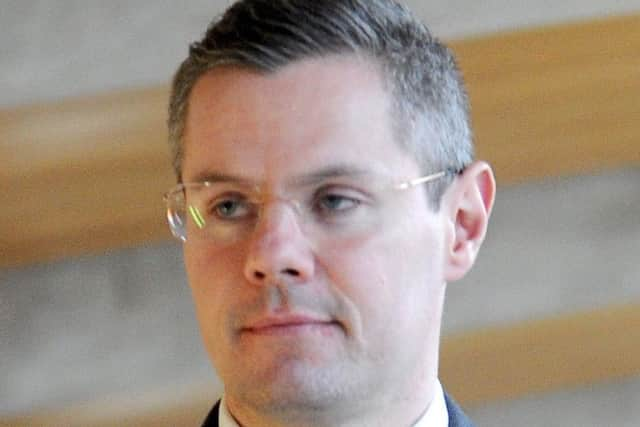SNP signals further tax hikes for middle class Scotland
Ahead of setting out his budget next week, Mr Mackay faces calls from the IPPR Scotland think tank to freeze the threshold at which people begin to pay the higher rate of income tax to lift 40,000 children out of relative poverty.
Scots earning above £33,000 already pay more than elsewhere in the UK following an overhaul of the tax bands introduced by the Scottish Government last year. However a majority of Scotland - about 55 per cent - pays less than elsewhere in the UK.
Advertisement
Hide AdAdvertisement
Hide AdThe tax gap is already poised to widen after Chancellor Philip Hammond unveiled plans in his recent UK budget to raise the higher 40p threshold south of the Border to salaries of £50,000 and above. In Scotland this rate, set at 41p, applies at salaries of £43,430 and above.


Mr Mackay said he wants Scotland to have a “competitive tax regime”.
“I will always follow the evidence to understand the tolerable levels of divergence,” he told the Financial Times. “However, I do not think that now is the time to pass on tax cuts to the richest.”
The minister said he is committed to progressive taxation but said he would not raise taxes if this meant lower revenues. Asked whether he thought Scotland is still some way from this, he responded: “That is my sense.”
If bands increase with inflation as expected next week, high earners would receive the biggest tax cut as the UK-wide personal allowance is raised.
But IPPR Scotland says freezing the higher rate threshold would still mean tax cuts, only not as steep.
This would raise £210 million for social security support, which could lift 40,000 youngsters out of poverty if applied over the next three years.
Rachel Statham, IPPR Scotland Economic Analyst, said: “The Scottish government should consider action on the higher rate tax threshold at next week’s budget. Our analysis shows that if tax bands go up with inflation as usual, higher earners in Scotland – those earning over £43,430 a year - could receive a tax cut over three times larger than someone earning minimum wage. At a time when public finances are under considerable strain, Scotland can’t afford this.
Advertisement
Hide AdAdvertisement
Hide Ad“By freezing the higher rate tax threshold, the point at which earners begin to pay the 41p tax rate, we could raise additional tax revenue. This could be spent on the Scottish government’s clear priorities.”
The Scottish Government overhauled the income tax system for 2018/19 after control over rates and bands were devolved to Holyrood. It saw the creation of five bands, including the new starter and intermediate rates. Mr Hammond’s changes for next year will means Higher earners pay significantly more in Scotland than elsewhere in the UK. Even if the Scottish income tax bands only move with inflation, workers making £50,000 north of the Border face tax bill £1300 Higher than their UK counterparts from April.
SNP strategists claim policies such as taxpayer-funded university education, prescriptions and personal care for the elderly, as well as lower water and council tax charges, are popular enough to have resulted in a broader acceptance among middle class Scots of the case for modest tax hikes.
But Scottish Conservative shadow finance secretary Murdo Fraser voiced concern over Mr Mackay’s comments.
“This is a clear hint from Derek Mackay that he’s considering even higher taxes for Scotland,” Mr Fraser said.
“We’ve already heard from numerous businesses warning against this, pointing out the damage a tax differential would do to Scotland’s economy.
“The SNP government has also been told about the damage to public sector recruitment which could be caused by further tax hikes.
“But these remarks by the finance secretary confirm he simply isn’t listening to these experts on this vital matter.”
Advertisement
Hide AdAdvertisement
Hide AdOther parties at Holyrood, including Labour and the Greens, are likely to support the push for more tax increases hinted at by Mr Mackay. He could freeze the higher rate salary threshold rather than increase it in line with inflation which would raise an extra £64 million. He could also increase the rate itself from 46 pence to 47 pence.
Labour says changes to the tax system can deliver “real change”.
Labour finance spokesman James Kelly said: “We want a Scottish budget where the richest pay their fair share to properly fund public services and tackle inequality.
“The SNP has taken Tory austerity and quadrupled it for local lifeline services, while Theresa May’s government has clearly broken its promise to end austerity.
“Income tax is devolved and, as this important report makes clear, making different choices on the higher rate threshold in Scotland could lift 40,000 children out of poverty.
“The SNP must deliver a progressive tax system that meets the needs of communities across Scotland.”
John Dickie, director of the Child Poverty Action Group in Scotland, said the IPPR analysis shows how Holyrood’s tax and benefit powers can be used to make a “dramatic impact” on child poverty.
He said: “With UK government benefit cuts driving more and more families into hardship the Scottish Parliament must use every tool in its toolbox to protect Scotland’s children and meets its own statutory child poverty targets. The Scottish Government’s commitment to a new Income Supplement by 2022 is very welcome, but hard up families really cant wait that long. This new analysis demonstrates the kinds of impact that can be made now.”
